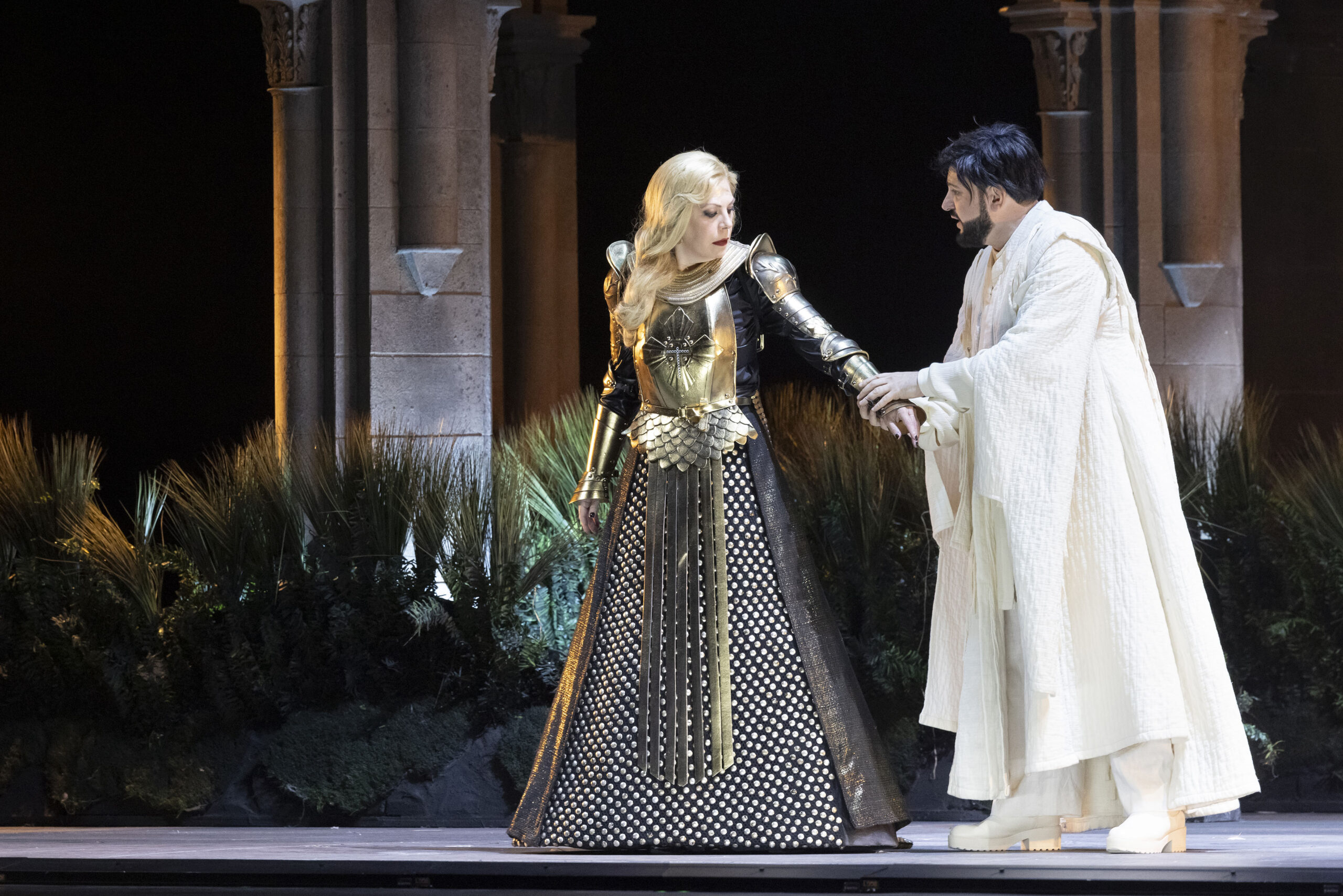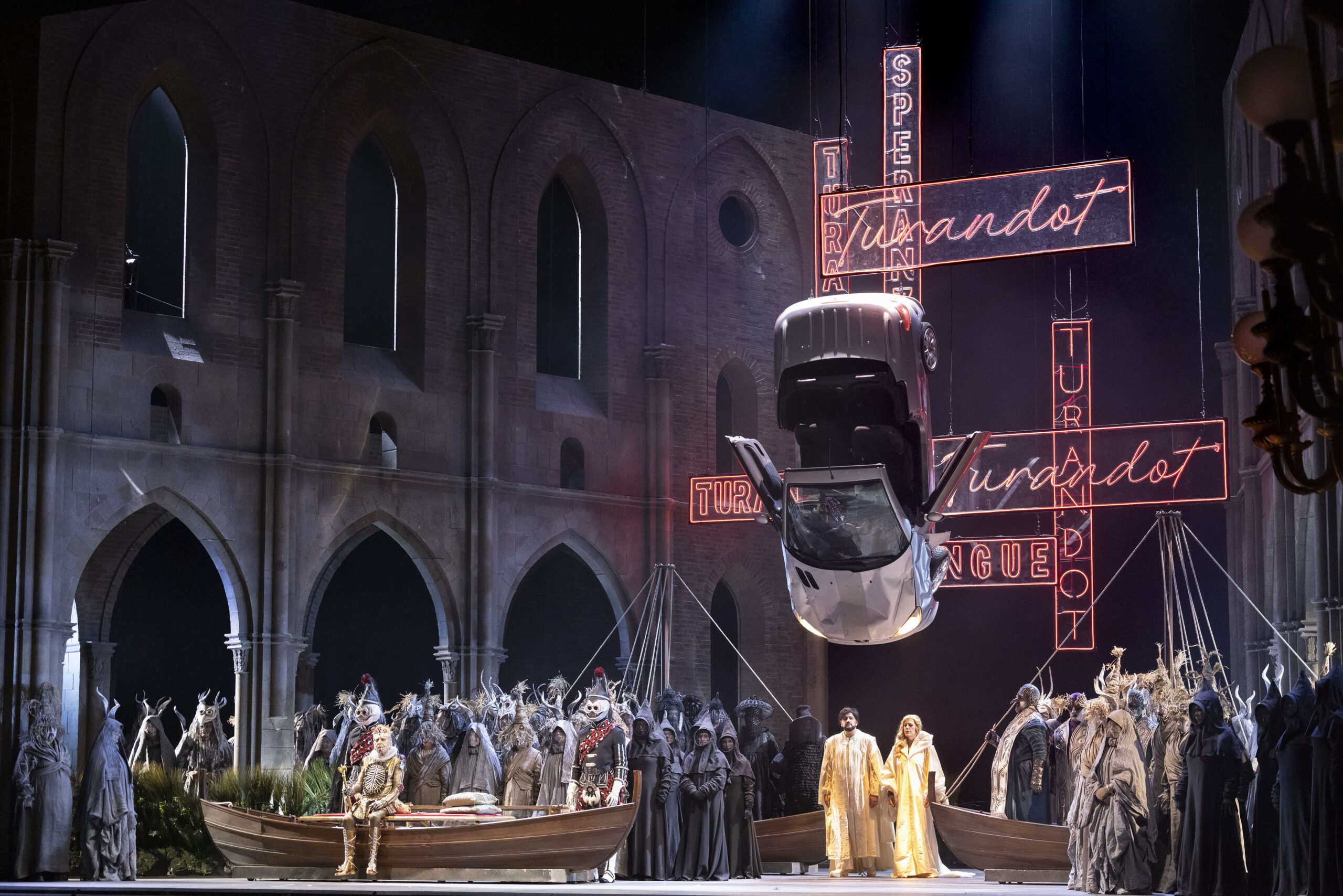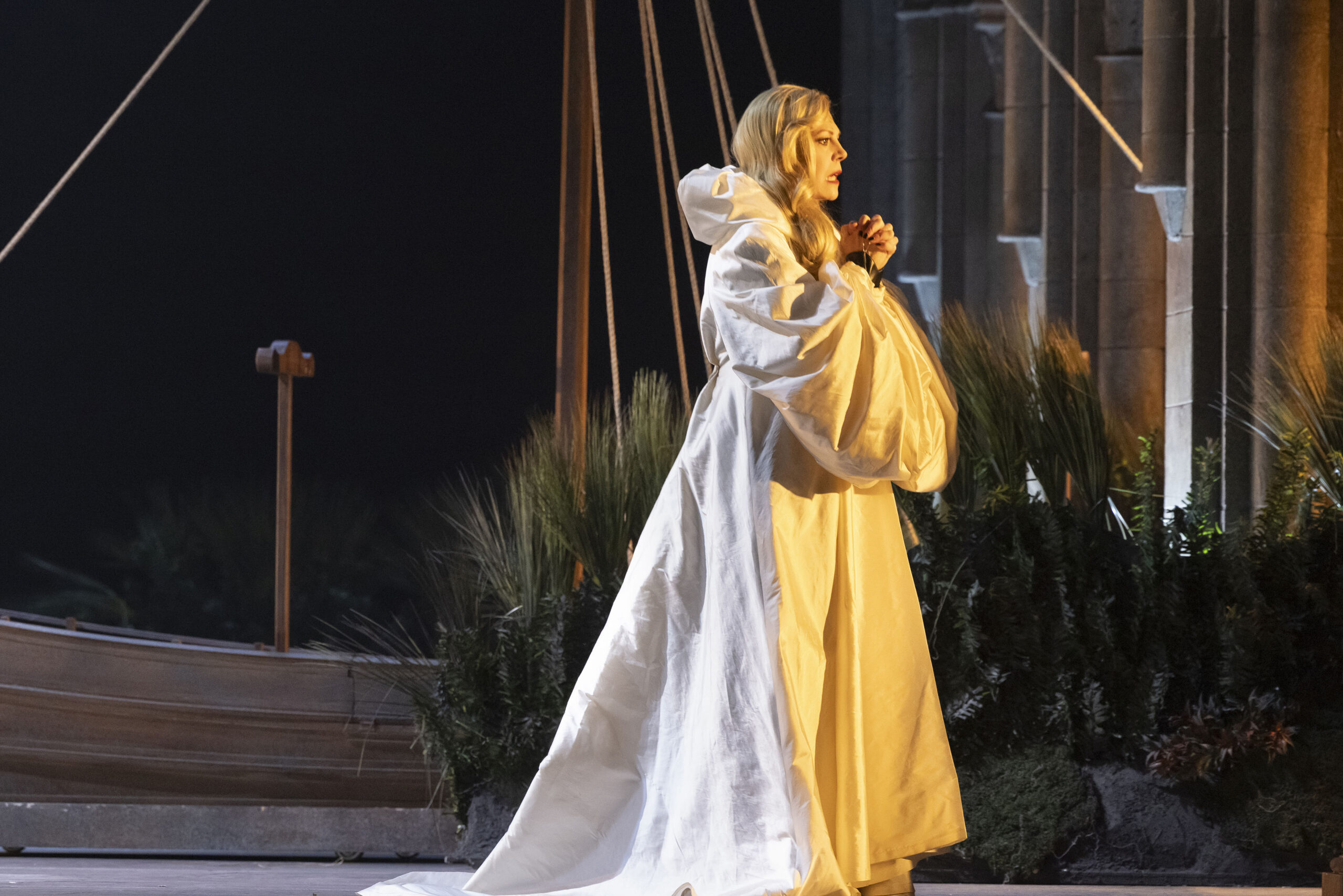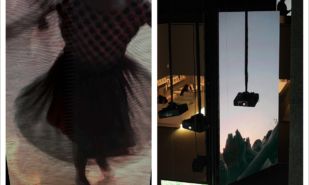On December 7, 2023 Teatro alla Scala in Milan had a magnificent opening of the new season, with a magnificent cast of singers appearing in Verdi’s Don Carlo conducted by Riccardo Chailly – we have written about this long, but undoubtedly a very successful evening. Just a few days after it, on December 9, 2023, Teatro San Carlo, the oldest functioning opera house in the world that opened in 1737 by the decree of the King of Naples Charles VII, also opened its new season, and it was a spectacular night. The renowned opera director Vasily Barkhatov staged Puccini’s Turandot for the occasion, and it was a double debut for him, as it was his first collaboration with Teatro San Carlo, and also his first production of Puccini’s Turandot, while Barkhatov believes that every opera director should stage this opera at least once in his life. A single glance at the announced cast and creative team suggested that the production promised to be a good one, and on the whole, it did not deceive our expectations.
Tonight you dream of Turandot: Teatro San Carlo in Naples opens its new season
| Author | |
|---|---|
| Category | Columnists, Culture, Lifestyle, Town |
| Date | December 20 2023 |
| Reading Time | 6 min. |
Tonight you dream of Turandot: Teatro San Carlo in Naples opens its new season

Turandot/©Luciano Romano
Although there are only 1,385 seats in this auditorium (as compared to 3,000 in La Scala), the reactions at the end of the opera were very emotional and included some boos for the director, as the audience in Naples is generally more conservative than in European capitals. So, what interesting things did Vasily Barkhatov, his creative team (that included set designer Zinovy Margolin, lighting designer Alexander Sivaev and costume designer Galya Solodovnikova) had to offer? How well did such acclaimed singers as tenor Yusif Eyvazov in the role of Calaf and American-Canadian soprano Sondra Radvanovsky as Turandot? We could all appreciate their appearances in this opening thanks to the Medici TV broadcast, so there was a way to form an opinion. What made the roles of the deposed Tatar king, Kalaf’s father Timur (Alexander Tsymbalyuk) and the slave girl Liù (Rosa Feola), as well as the Turandot’s father, Emperor Althoum (Nicola Martinucci) memorable? Why was this production interesting to watch, as if it was the director himself and not Princess Turandot who presented us with riddles so difficult to solve? It is indeed exciting to figure all those things out.
Puccini’s opera Turandot (1926) was unfinished due to the composer’s death, and after the premiere by Toscanini where the opera was stopped right when the composer didn’t finish it, it was later performed with Franco Alfano’s orchestration of the final part. It is based on the fairy tale Turandot (1762) by Carlo Gozzi, where princes from all over the world woo the Chinese princess Turandot, the daughter of Emperor Althoum, who is as beautiful as she is callous, as all those who fail to solve her three riddles must be executed. While the play has a few additional characters from Calaf’s regal past, or involved with the princess’s attempts to answer Calaf’s riddle and find out his name, Puccini reduces them to Calaf’s father Timur and the slave girl Liù, who is in love with Calaf. Instead of Gozzi’s eunuchs, the composer introduces a whole group of ministers who dream of stopping to execute people in order to return to a peaceful life – Ping (baritone Roberto di Candia), Pong (tenor Francesco Pittari) and Pang (tenor Gregory Bonfatti), who are joined by the administrative official Mandarin (the baritone Sergio Vitale). In brief, China is very conventional in Gozzi’s tale and in Puccini’s opera, but it always allowed the directors to create an exotic fairy tale on stage.
But Barkhatov takes another step – he doesn’t need an exotic fairy tale on stage and a story of Calaf conquering his princess, while various servants of the Chinese court and the princess herself prevent him from doing so. Who would be interested in that today, decides Barkhatov, and he might have a point. The opera director turns to deeper mythological structures, mixing ancient Greek mythology with Roman poetry and Renaissance symbolism, and superimposing it on modernity. All the meanings and quotations selected for the production are dealing with the fine line between life and death. The space of the production in the vision by set director Zinovy Margolin with Alexander Sivaev’s magnificent and eerie lighting is not a Chinese fairytale kingdom, but a liminal space where the characters must deal with their subconscious and suppressed emotions. And there is a lot to sort out for them – on the video that precedes the first and second acts, we see a black and white ‘Italian’ movie, where our two protagonists (those who will later become Calaf and Turandot performed by Yusif Eyvazov and Sondra Radvanovsky) are driving a car from the funeral of the main character’’s father, who was apparently the main heroine’’s husband. They are talking about something forbidden – it seems they try to sort out who didn’t love whom, and who was to blame, but in fact what they talk about is who can love whom now and why. And it turns out that Euripides’ Phaedra is also part of the context here, as Calaf’s love for the future Turandot is an inverted projection of the forbidden love of Phaedra to her stepson in the ancient Greek myth, but here the stepson is in love with his stepmother and suppresses this feeling. Suddenly there is a car crash – we learn about it, as we see a huge rocket-like car that moves onto the stage from above, with the intensive care team fussing about the bodies.
It is this important starting point, where Freudian motifs are mixed with Greek myths, that will be the source of the visions that the characters will have later on. The entire action of Puccini’s Turandot is presented as a series of visions of these two would-be-lovers who had an accident and did not have time to openly proclaim their forbidden feelings for each other. In the first act we see the action through the eyes of the main character lying in a coma, as he imagines himself as Calaf in a fairytale story, seeking the love of the exotic princess Turandot. In the second act we see the proceedings through the eyes of the heroine, who is also lying in a coma and is perceived by us as Turandot. In the third act they both throw off their former golden shell-like (in the case of Turandot) or dark wanderer’s clothes (in the case of Calaf) and come out in white clothes resembling hospital robes, where the heroine’s beautiful hair flutters beautifully and the happiness of lovers’ union suddenly becomes possible. In this space they unite in love, as we realise that love, contrary to Orpheus and Euridice’s myth, has been successful in winning. We can assume that both characters survived the car crash, although no precise answer is given by the director.

Turandot/©Luciano Romano
Act I opens with the lines from Canto Three of Dante’s Inferno – there the narrator meets Charon, who is transporting the dead souls to the other side of the Acheron River. Charon does not allow him to use the same transport, as the living need a “lighter boat must carry thee”. Act II opens with a passage from Ovid’s Metamorphoses, where Orpheus says that if he cannot bring Eurydice back to life, he is prepared to stay in the realm of the dead with her. The action unfolds under the huge vaults of a church (it has many meanings, as it is both a place for a funeral and a place for purification of the soul), and from its ceiling the hospital wards of both characters descend – we observe the doctors making every effort to bring them back to life (and their Calaf and Turandot do the same, watching themselves from the outside). And so it means that the whole fairy tale unfolding before us, with its ridiculous ministers looking like huge birds, with all the creatures in horned animal masks inhabiting the palace, and with the Emperor Althoum (Nicola Martinucci) riding out in a walled-up sarcophagus and talking like a ghost rising from the dust or a colourful horned beetle with diamonds on his toy crown, is just part of the characters’ nightmare or painful visions. They see it, as their whole lives, including their childhood, flash before them – here we can see very interesting videos with faces of the characters gradually transforming into children’s faces.
In this interpretation, Calaf’s father Timur (Alexander Tsymbalyuk), dressed in a modern costume, and his devoted slave (here, apparently, either his sister or his former girlfriend, who had cut her veins – it is mentioned in the black and white film footage) Liù (Rosa Feola) are also figments of the hero’s imagination. They are definitely dead in real life (we know it), and therefore actively participating in the fairy tale that is taking place in the liminal space of the character’s dream. Both Tsymbalyuk and Feola sing beautifully and powerfully, complementing the musical ambiance of the opera (conducted by Dan Ettinger). Perhaps it is Yusif Eyvazov, on whose character the director has put so much emphasis, as he is Orpheus who goes after his Eurydice, that doesn’t fully vocally and psychologically fit here. Eyvazov seems to be earnestly following the director’s instructions, standing where he should be, singing according to the notes and intoning excessively, but the whole concept is obviously too complex for him, as Barkhatov’s cultural multivalence was not present in his singing, and often his voice was strained and his dynamics uneven.

Turandot/©Luciano Romano
It was Sondra Radvanovsky that undoubtedly starred on the opening night. The soprano made her character lose her shell of a callous princess, and appeared as a living, suffering person who had invented fearsome creatures and fairy-tale riddles in order not to suffer. This fits well with the concept of Puccini, as his Turandot mentions her disgraced grandmother, Princess Lo-u-Ling, and says that she now lives in her. The singer shows how her character dispels the carcass of previous frustration (it physically falls off her) and opens her heart and body to emotions. Despite the dissatisfaction of some viewers, Barkhatov’s production is undoubtedly very clever and interesting, boldly weaving together the myths embedded in our cultural background with our concealment of true emotions and our inability to remove the outward fences that we have built to hide behind. We definitely recommend watching this opera on Medici TV or in Naples – it will run in Teatro San Carlo until mid-December!




